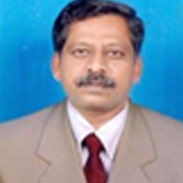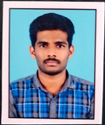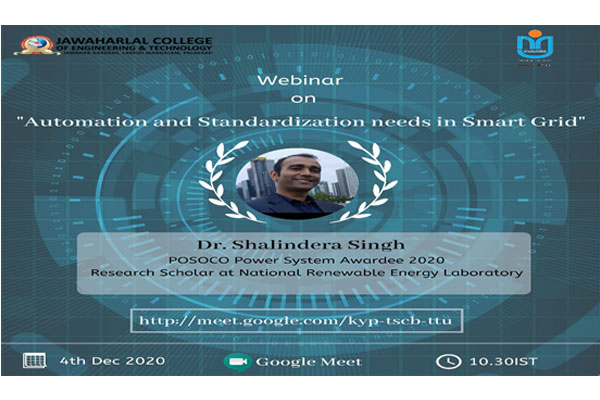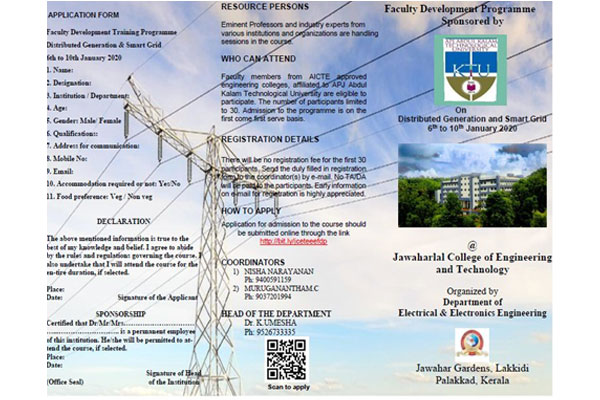- +91 9605 771 555, +91 7510 331 777
- jcetadmissions@nehrucolleges.com
- Counselling Code : JCE
Electrical and Electronics Engineering
About
The Department of Electrical and Electronics Engineering at JCET was established in the year 2011. It offers B.Tech in Electrical & Electronics Engineering. The intake for the undergraduate (B.Tech.) programme is 60. The department is driven by a team of highly motivated, dedicated and experienced teachers supported by a strong team of lab technicians. The Department functions from the NEW block (floor 1), and has excellent infrastructural facilities including well equipped laboratories.
Electrical and Electronics engineering is one of the fastest growing fields of engineering which deals with the study and application of electricity and electronics. This field is an amalgamation of electrical, electronics and communication, computer engineering etc. There are four well known branches of Electrical Engineering which are power and Energy system, Power Electronics, electronics, communication, and control systems. Importance of Electrical engineering lies in the areas of Generation, its transmission and distribution and their control. Today Electrical Engineers have become indispensable to the society because of the increasing demand for electrical energy, the development in audio and video communication systems, and the Industrial automation.
The main job of an electrical engineer is to design and develop more efficient electrical machinery, power and energy systems, and control equipment for the generation, transmission and distribution of electrical energy and telecommunication. electrical engineering is an exciting and dynamic field. graduates in electrical engineering are always at the forefront of technology innovation right from generation and conversion of electric power lead to the design and development of electronic circuits. electrical engineers provide the necessary technological leadership to solve tomorrow’s societal problems — today!

Dr.Umesha K
B.E, M.E, PhD
Vice principal & HoD
HOD's Desk
Welcome to the department of Electrical and Electronics Engineering in Jawaharlal college of engineering and technology (JCET), a part of highly reputed Nehru group of institutions (NGI) in Kerala and Tamilnadu.
The "ELECTRICAL AND ELECTRONICS ENGINEERING” has become a Mother branch of Engineering by virtue of the demand in terms of wide applications. It has been the exemplary vision, meticulous effort and undivided commitment of all scientists and academicians and great industrialists over decades who have brought out advances in technology.
Today, study of Electrical and Electronics Engineering at JCET is a dream of every one who aspires to be a leader in Engineering, simply because department has perfectly streamlined functional systems. The system at JCET is perfect as all its state of art labs have been designed keeping in view the vision and mission of the institute, operate synchronously, and undergo continuous improvements. This holistic approach to Engineering education is what distinguishes JCET from others.
The vision and mission of Electrical and Electronics Engineering are firmly based on the ground reality of our world. We understood from the fast developing technology that our world is getting more and more complex with every passing day. Apparently, this complexity is becoming incomprehensible and intractable even with great efforts by Technical Institutes, Industries R&D and professionals. The engineering problems arising out of this complexity are huge, unique, and often unpredictable in implications. Only Electrical Engineers who can take a holistic approach, who have the right competencies, who can lead interdisciplinary teams, and who can engage in continuous experimentation and life-long learning can provide complete solutions to these problems. Such an approach is inevitable for sustainable and inclusive economic development of the Globe too.
Hon’ble Management of the institute, with a great clarity in its vision, has been very proactive in establishing a vast, green and serene campus; building world-class infrastructure, modern class rooms and state-of-the-art laboratories; allowing free hand to mould true citizens create an exceptional human capital for Training, research and extension services; and supporting all collaborative and networking efforts.
Once again, I welcome all the aspirants of Engineering to JCET to study desired Branch along with Electrical and Electronics Engineering to Power the nation and Globe at large and self-empowerments also.

Rachel Stefna Angeline
DESIGNATION : Assistant Professor
Email Id : rachel@jawaharlalcolleges.com

Ms. Nisha Narayanan
B.Tech., M.Tech
DESIGNATION : Assistant Professor
Email Id : nishanarayanan@jawaharlalcolleges.com

Ms. Sayana M
B.Tech., M.E
DESIGNATION : Assistant Professor
Email Id : sayanam@jawaharlalcolleges.com

Ms. Saranya Nair
B.Tech., M.Tech
DESIGNATION : Assistant Professor
Email Id : saranya@jawaharlalcolleges.com

Ms. Preetha K G
QUALIFICATION : Diploma
DESIGNATION : Lab Assistant

Mr. Sukesh P K
QUALIFICATION : ITI
DESIGNATION : Lab Assistant
Email Id : sukeshpk@jawaharlalcolleges.com
Department Library
Well equipped labs
- Machines lab
- Instrumentation Lab
- Power electronics and drives lab
- Electrical workshop
- System and control lab
Achievements
Sneha Raj C
- Sneha Raj C achieved Third Rank in the year 2017 Calicut university examination.

will be updated soon
News & Events
Webinar - AUTOMATION & STANDARDISATION NEEDS IN SMART GRID
AUTOMATION & STANDARDISATION NEEDS IN SMART GRID held on 04/12/2020

Faculty Development Programme
“DISTRIBUTED GENERATION AND SMART GRID” 6th - 10th January, 2020

will be updated soon
Vision
- Equip students to attain effective interaction with technical organizations through research and consultancy.
- Establish appropriate sustainable relationship with common people for rural needs.
Mission
- To achieve world class excellence in advanced electrical technologies through focused theoretical learning & practical research.
- Establishing suitable environment for students to nurture talent and to obtain entrepreneurial skills and leadership qualities for self and social development.
- To provide ethical and value based education for promoting a sense of responsibility towards nation building, social causes and environment conservation.
Program Educational Objectives
- Possess successful careers in Electrical Sciences, and allied areas to pursue higher education and technical skill with a broad knowledge base in Mathematics and Engineering principles .
- Utilize their technical, analytical, communicative and managerial skills and knowledge for societal progress and enrich them to keep in better pace with relevant advancements by engaging themselves in lifelong learning
- Exhibit professionalism by displaying competence, leadership, dedication and commitment.
Program Specific Objectives
Graduates possess
- Ability to have good foundation in theoretical and practical aspects of Electrical & Electronics Engineering.
- Ability to model, analyze, design and realize physical systems, components or processes thereby adapt themselves to the latest research and developments in the field of Electrical & Electronics Engineering.
- Ability to communicate and work professionally as well as take up entrepreneurial endeavors in the field of Electrical Engineering and allied areas for the benefit of the society.
|
SUB CODE |
SUB NAME |
TEXT BOOKS |
|
EE401
|
ELECTRONIC COMMUNICATION
|
1.Kennedy G., Electronic Communication Systems, McGraw-Hill, New York, 2008. 2. Roody and Coolen, Electronic Communication, Prentice Hall of India LTD., New Delhi,2007 |
|
EE403
|
DISTRIBUTED GENERATION AND SMART GRIDS
|
1. Ali Keyhani, Design of Smart Power Grid Renewable Energy Systems, ISBN: 978-0-470-62761-7, Wiley 2. James Momoh, Smart Grid: Fundamentals of Design and Analysis, ISBN: 978-0-470-88939-8, Wiley 3. R. C. Durgan, M. F. Me Granaghen, H. W. Beaty, “Electrical Power System Quality”, McGraw-Hill 4. Remus Teodorescu, Marco Liserre, Pedro Rodriguez, Grid Converters for Photovoltaic and Wind Power Systems, ISBN: 978-0-470-05751-3, Wiley 5. S. Chowdhury, S.P. Chowdhury and P. Crossley, Microgrids and Active Distribution Networks, ISBN 978-1-84919-014-5, IET, 2009 |
|
EE405
|
ELECTRIC SYSTEM DESIGN
|
1. J. B. Gupta, A Course in Electrical Installation Estimating and Costing, S.K. Kataria & Sons; Reprint 2013 edition (2013). 2. K. B. Raina, S. K. Bhattacharya, Electrical Design Estimating Costing, NEW AGE; Reprint edition (2010). 3. M.K.Giridharan, Electrical Systems Design, , M/s I K International Publishers, New Delhi, 2nd edition, 2016 |
|
EE407
|
DIGITAL SIGNAL PROCESSING
|
1. Alan V.Oppenheim, Ronald W. Schafer & Hohn. R.Back, “Discrete Time Signal Processing”, Pearson Education, 2nd edition, 2005. 2. Emmanuel.C..Ifeachor, & Barrie.W.Jervis, “Digital Signal Processing”, Second edition, Pearson Education / Prentice Hall, 2002. 3. John G. Proakis & Dimitris G.Manolakis, “Digital Signal Processing Principles, Algorithms &Applications”, Fourth edition, Pearson education / Prentice Hall, 2007 |
|
EE409 |
ELECTRIC MACHINE DESIGH |
1. A K Sawhney, “ A Course in Electrical Machine Design”, Dhanpat rai and sons, Delhi. |
|
Subject code |
Subject Name |
Book |
|
EE402 |
Special Electrical Machines |
E. G. Janardhanan, ‘Special Electrical Machines’ PHI Learning Private Limited. |
|
EE 404
|
INDUSTRIAL INSTRUMENTATION AND AUTOMATION
|
1. Curtis D Johnson ,” Process Control Instrumentation Technology”, PHI, 1986 2. Doeblin E.O, ‘Measurement Systems: Application and Design, Fourth Edition, McGraw Hill, Newyork, 1992 3. DVS. Murty, ‘Transducers and Instrumentation’ Second Edition, PHI Learning Pvt Ltd New Delhi ,2013 4. Madhuchhanda Mitra, Samarjit Sengupta, ‘Programmable Logic Controllers and Industrial Automation An Introduction’, Penram International Publishing (India) Pvt Ltd., 2009 5. Mickell. P. Groover ‘Automation, Production and computer integrated manufacturing’ Prentice Hall of India, 1992 6. Patranabis, D., ‘Principles of Industrial Instrumentation’, Second Edition Tata McGraw Hill Publishing Co. Ltd.. New Delhi 7. Robert B. Northrop, ‘Introduction to instrumentation and measurements’, CRC, Taylor and Francis 2005 |
|
EE474
|
ENERGY MANAGEMENT AND AUDITING
|
1. Albert Thumann, William J. Younger, Handbook of Energy Audits, CRC Press, 2003. 2. Charles M. Gottschalk, Industrial energy conservation, John Wiley & Sons, 1996. 3. Craig B. Smith, Energy management principles, Pergamon Press. 4. D. Yogi Goswami, Frank Kreith, Energy Management and Conservation Handbook, CRC Press, 2007 5. G.G. Rajan, Optimizing energy efficiencies in industry -, Tata McGraw Hill, Pub. Co., |
Other Links
-
B.Tech.
Aeronautical Engineering -
B.Tech.
Civil Engineering -
B.Tech. Computer Science
and Engineering -
B.Tech. Electrical and
Electronics Engineering -
B.Tech. Electronics and
Communication Engineering -
B.Tech.
Mechanical Engineering - M.Tech. Applied Electronics And
Communication Systems - M.Tech. Communication Engineering
and Signal Processing - MBA
Copyright © 2025 | All Rights Reserved.
